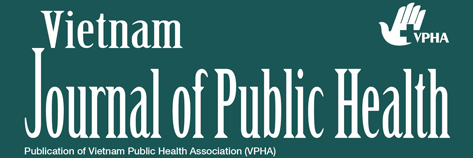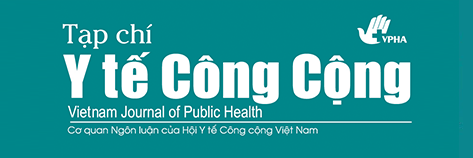Xây dựng bộ câu hỏi đo lường nhận thức và hành vi sử dụng nước thải của người dân trong sản xuất nông nghiệp tại xã Hoàng Tây và Nhật Tân tỉnh Hà Nam theo Thuyết động lực bảo vệ (Developing a questionnaire to measure awareness and behaviours of people in relation to wastewater use in agriculture at Hoang Tay commune and Nhat Tan commune, Ha Nam province following Protection Motivation Theory)
Tóm tắt
Sử dụng nước thải giúp tăng sản lượng nông nghiệp và thủy sản. Tuy nhiên, việc sử dụng nước thải không thích hợp là một trong những nguy cơ ảnh hưởng tới sức khỏe con người. Đề tài nghiên cứu này tìm kiếm giải pháp nâng cao nhận thức và thực hành của người dân liên quan đến sử dụng nước thải theo Thuyết động lực bảo vệ.
Nghiên cứu được thực hiện từ năm 2008 – 2009 ở xã Hoàng Tây và Nhật Tân, huyện Kim Bảng, tỉnh Hà Nam. Áp dụng phương pháp nghiên cứu định tính ở 30 đối tượng, tìm hiểu nhận thức của người dân theo Thuyết động lực bảo vệ (PMT) và làm cơ sở xây dựng bộ câu hỏi đánh giá nhận thức và thực hành của người dân về sử dụng nước thải trong sản xuất nông nghiệp. Nghiên cứu định lượng được tiến hành nhằm xác định tính giá trị và độ tin cậy của Bộ câu hỏi dựa trên phỏng vấn 335 đối tượng lần 1, kiểm định lại độ tin cậy bằng cách phỏng vấn lặp lại lần 2 sau 30 ngày với 64 đối tượng. Nghiên cứu cho thấy người dân còn thiếu hiểu biết về nguy cơ sức khỏe do sử dụng nước thải chưa đảm bảo an toàn và chưa thực hiện tốt biện pháp phòng bệnh. Bộ câu hỏi xây dựng cuối cùng có 34 câu với 9 nhân tố, đảm bảo tính giá trị về cấu trúc và logic với chỉ số tin cậy cronbach’s Alpha trên 0,65 và chỉ số tương quan giữa các nhân tố từ 0,11 đến 0,35 (P<0,05).
Để thực hành sử dụng nước thải trong nông nghiệp một cách an toàn hơn cần có động lực thực hiện hành vi phòng bệnh của người dân thông qua nâng cao nhận thức về khả năng phòng bệnh, nỗi sợ về bệnh, hiệu quả phòng bệnh và mức độ nguy hiểm của bệnh.
English abstract
The use of wastewater increases agricultural and aquacultural production. However, inappropriate use of wastewater is one of the major risks to human health.
The study investigated the solutions to improve the farmer’s awareness and practices associated with the use of wastewater based on the Protection Motivation Theory (PMT) framework. The study was carried out in 2008 - 2009 in Hoang Tay and Nhat Tan communes, Kim Bang district, Ha Nam Province. People’s awareness and practices in relation to wastewater reuse were identified through in-depth interviews and observation of 30 participants. These results were the basis for formulating questionnaires using PMT. Once the questionnaire has been developed, a survey using the questionnaire was conducted with 335 interviews. Sixty four people among these 335 persons were interviewed for a second time to verify the reliability of the questions. Study results revealed that people lack knowledge of the health risks related to wastewater use, unsafe use of wastewater and incorrect practices of using protective measures to prevent diseases. The developed questionnaire was validated to ensure the structural and logical values. The questionnaire of 34 questions focuses on nine different factors, and the reliability index of these questions is all above 0.65 Cronbach's Alpha, and correlations of PMT coefficients vary between 0.11 and 0.35 (P <0.05). To safely use wastewater in agriculture, farmers should have motivation to prevent diseases through improving their awareness with regard to self-efficacy, fear, vulnerability, and severity.
Từ khóa
Toàn văn:
PDF (English)##submission.citations##
Bộ Tài nguyên và Môi trường (2006), Hiện trạng môi trường nước 3 lưu vực sông: Cầu, Nhuệ-Đáy, hệ thống sông Đồng Nai, Báo cáo môi trường Quốc gia, Hà Nội.
Hoàng Trọng & Chu Nguyễn Mộng Ngọc (2008), Phân tích dữ liệu với SPSS, Nhà xuất bảng Hồng Đức, Thành phố Hồ Chí Minh.
Annette Prüss-Üstün, Robert Bos, Fiona Gore & Jamie Bartram (2008), safer water, better health, WHO.
Eunju Yoon (2007), Food defense management plan implementation intention: An application of protection motivation theory, Kantas State University.
Marjorie A. Pett, Nancy R.Lackey & Jhon J. Sullivan (2003), Making sense of factor analysis, Sage Publications.
MedCalc, Inter-rater agreement (kappa). Available from http://www.medcalc.be/manual/kappa.php, accessed 06/10/2009.
Pallant, J. (2001), SPSS survival manual, Allen & Unwin, Australia.
Phuc, P. D., Konradsen, F., Phuong, P. T., Cam, P. D. & Dalsgaard, A. (2006), "Practice of using human excreta as fertilizer and implications for health in Nghean Province, Vietnam", Southeast Asian J Trop Med Public Health, 37(1), pp. 222-9.
R. C. Plotnikoff & N. Higginbotham (2002), "Protection Motivation Theory and exercise behaviour change for the prevention of coronary heart disease in a high-risk, Australian representative community sample of adults", PSYCHOLOGY, HEALTH & MEDICINE,, 7(1), pp. 88-98.
University of Twente, Topics Studied in PMT Literature. Available from http://bama.ua.edu/~sprentic/672%20PMT%20topics.html, accessed 06/10/2009.
University of Twente (2009), Topics Studied in PMT Literature. Available from http://bama.ua.edu/~sprentic/672%20PMT%20topics.html, accessed.
Vuong, T. A., van der Hoek, W., Ersboll, A. K., Nguyen, V. T., Nguyen, D. T., Phung, D. C. & Dalsgaard, A. (2007), "Dermatitis among farmers engaged in peri-urban aquatic food production in Hanoi, Vietnam", Trop Med Int Health, 12 Suppl 2, pp. 59-65.
WHO (2006), WHO guidelines for the safe use of wastewater, excreta and greywater.



